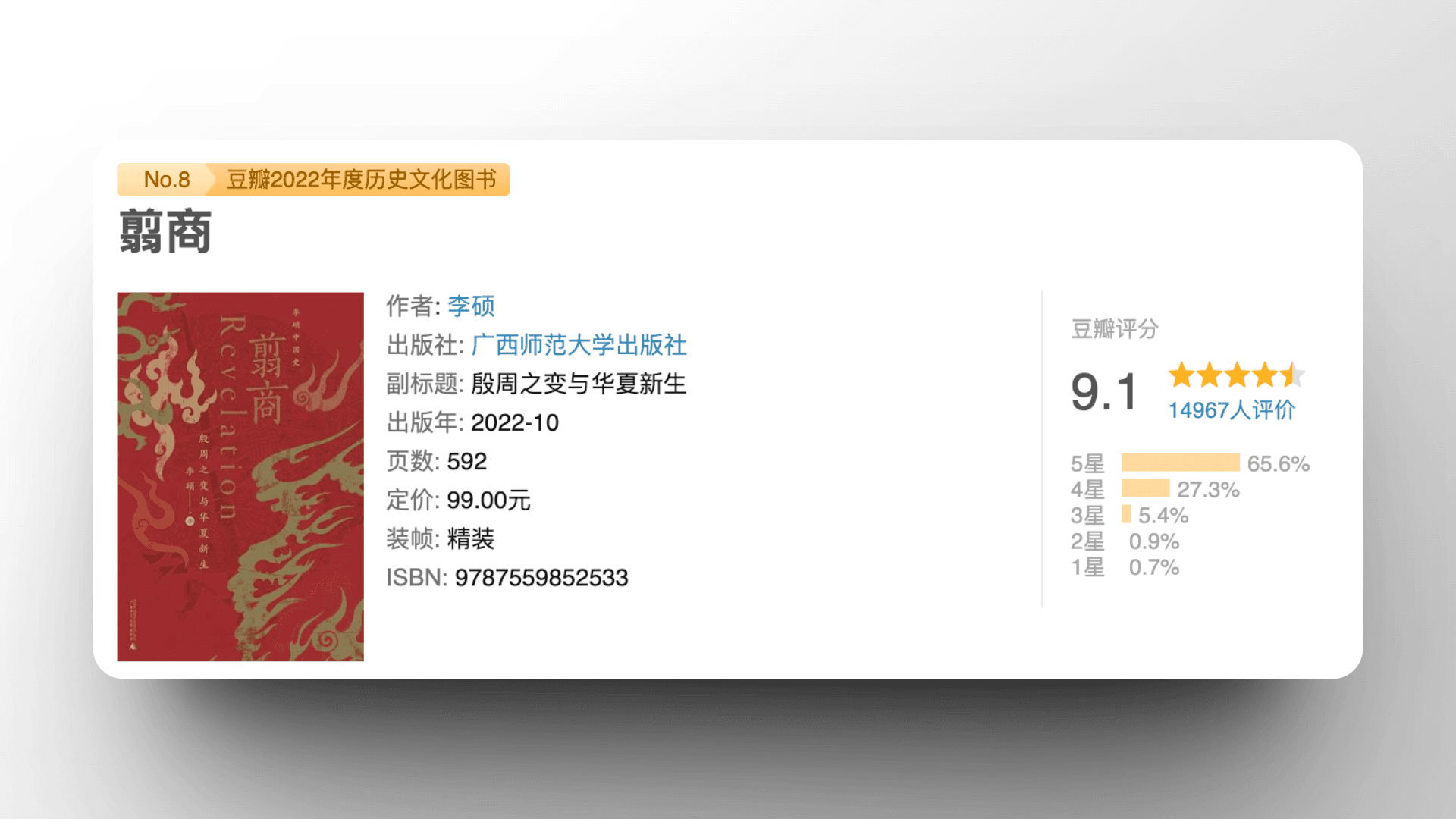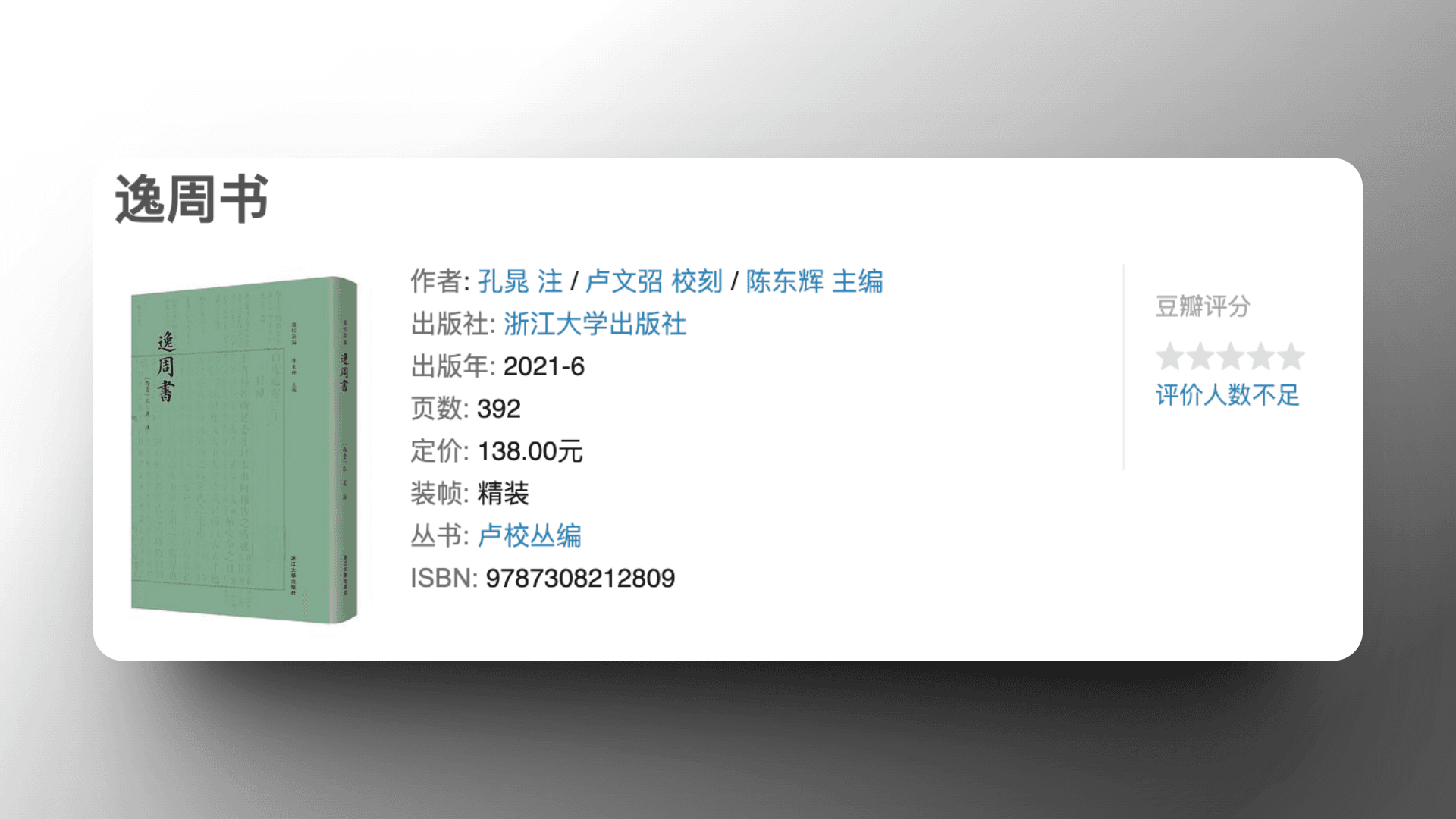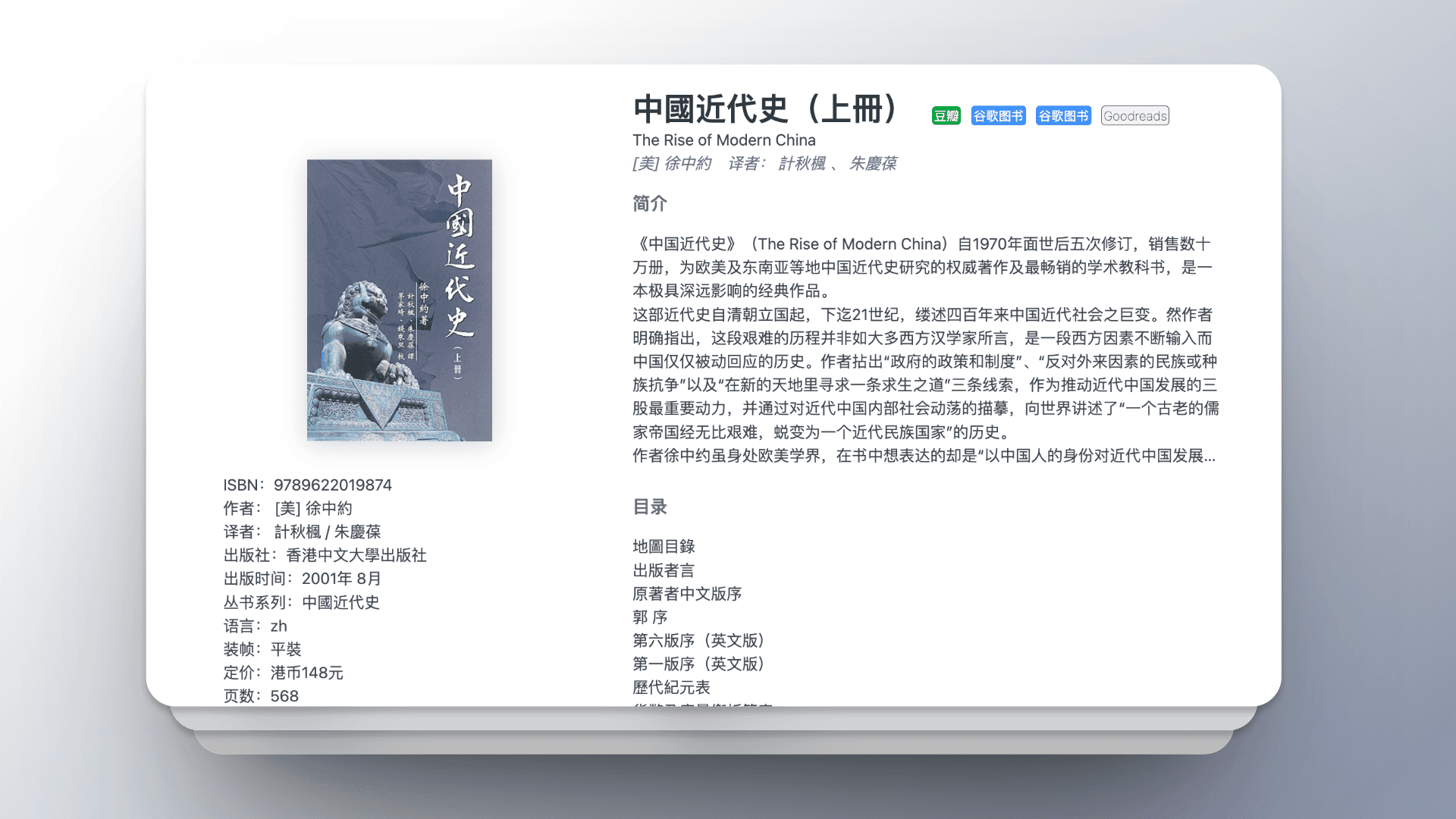
Preface#
I have always been interested in the history of the Xia, Shang, and Zhou dynasties, which may be related to many TV dramas based on the "Investiture of the Gods". I added Li Shuo's "Jian Shang" to my reading list a long time ago, but I never had the time to open it. Finally, this month, I had some time to flip through it.
During the reading, it often reminded me of a TV drama from more than twenty years ago - the version of "Investiture of the Gods" starring Chen Haomin. This TV drama, which now seems a bit absurd and funny, used to attract me to the TV and required me to occasionally adjust the antenna and pat the back of my head. The scenes that left the deepest impression on me were: Feitianwa Leizhenzi, Nezha who could remove his own flesh and bones, Qianliyan, Shunfenger, and the two generals, Hengha. I thought the imagination was so great and it was very funny.
After rewatching (with commentary), I realized how amazing Yin Shiniang was, which brought tears to my eyes several times. And Daji, played by Carina Lau, was so beautiful that I regretted not having good taste back then.
Here are the spiritual nourishments for August.
"Jian Shang"#

"Jian Shang" refers to the overthrow of the Shang Dynasty. Its origin is explained by Gao Heng, a historian and scholar, in the sentence "Hanzhang Kezhen" in the Book of Changes, which means that the overthrow of the Shang Dynasty can be predicted through divination. The reason why it is written so cryptically is that the matter of rebellion can only be secretly recorded.
The first half of the book is very exciting, listing a lot of archaeological content and gaining a lot. The second half gradually involves the explanation of the reasons behind it and begins to introduce a lot of speculative content. The author tries his best to reason based on ancient books and archaeological discoveries, without going off on a tangent, and eventually comes full circle. However, I didn't like it that much.
The archaeological content has overturned many of my impressions of the Xia, Shang, and Zhou dynasties, especially the phenomenon of human sacrifices. Human sacrifices were common in the Xia and Shang dynasties, and they can be divided into three types: human foundation, which refers to burying people in the foundation of buildings, including infants; human sacrifices, which refers to sacrificing humans as food to gods or ancestors; and human burial, which refers to being buried with the deceased.
After King Wu overthrew King Zhou, a large-scale human sacrifice was also held. The "Yi Zhou Shu" also mentioned it. According to the 37th record of the "Shi Fu Jie" in the "Yi Zhou Shu": when King Wu made sacrifices, hundreds of people were sacrificed, and thousands of livestock were sacrificed. After King Wu's death, the young King Cheng ascended the throne, with the assistance of Duke of Zhou. Under the leadership of Duke of Zhou, the cruel human sacrifices were gradually abolished.
"Yi Zhou Shu"#

"Jian Shang" ignited my desire to further understand the history of the Zhou Dynasty, so I found this book, "Yi Zhou Shu". There is currently no consensus on its origin. Cai Yong, a scholar from the Eastern Han Dynasty, believed that the author of "Yi Zhou Shu" was Duke of Zhou, while modern scholars generally believe that the book was compiled by people from the Jin Dynasty based on the Han Dynasty's "Yi Zhou Shu" and the unearthed "Zhou Shu" from Jizhong.
The book consists of seventy articles, eleven of which have titles but no content, covering the periods of King Wen of Zhou, King Wu of Zhou, Duke of Zhou, King Cheng, King Kang, King Mu, King Li, and King Jing, and discussing governance, military affairs, self-cultivation, and other aspects. Although it is ancient, the articles mostly use poetic rhyme, which is easy to understand. For example, when describing the performance of wise monarchs: "A wise king is not without joy or sorrow. People are numerous, and when people are numerous, rewards are plentiful and punishments are few. This is the beauty of governance. If punishments are excessive and rewards are scarce, it is the ugliness of governance. Excessive punishments lead to hardship, and excessive rewards lead to scarcity. Without hardship or scarcity, teaching cannot be achieved."
From the records in the book, the rulers of the Zhou Dynasty were all wise kings who cultivated themselves and governed the country with benevolence. Especially during the early period of King Wen of Zhou, King Wu of Zhou, and Duke of Zhou, they left behind a large number of principles such as "cultivating oneself, managing the family, governing the country, and bringing peace to the world". Many of the ideas advocated by later generations can be seen in the book. For the Zhou Dynasty, which lacks historical records, this book is a rare research material.
However, it is worth noting that the book was written during the heyday of Confucianism, and the spirit it embodies is the Zhou ritual advocated by Confucius. Therefore, some of the statements in the book are questionable. For example, in the chapter "Yin Zhu Jie" in the book, it is recorded that the people abandoned their wealth and joined Shang Tang, and Xia Jie actually said, "Since the people have all joined you, I will give you the throne." It can be seen that this part of the description is very idealized, just like the legend of Yao and Shun's abdication, it is not credible.
In comparison, I believe more in the account of the "Bamboo Annals", which states that both Shun and Yu used force to seize the throne. Just like Cao Pi said after seizing the throne, "I understand the stories of Shun and Yu." However, this history, which conforms to human nature but not to the Zhou ritual, is obviously unable to enter the classics of Confucianism, and even "Records of the Grand Historian" is no exception.
"How is Your Summer?"#

The author, Jin Aican, is an observant and delicate writer. Realistic people see reality in the book, and delicate people feel delicacy in the words. I am a more realistic person, so what I see is -
The anxiety and panic when being invited by a secretly admired senior, and the embarrassment when realizing being used; the dark and damp apartment, bugs that could crawl out from any corner, and the sudden appearance of anticipated fear; a father who died while demanding unpaid wages, a sick mother, an apartment facing demolition with no water or electricity, and a flood caused by continuous heavy rain, the despair of being abandoned by life... The book depicts a group of people facing such predicaments. It's a bit depressing, but very realistic. It seems that you can find such prototypes around you just by looking up.
"Modern Chinese History"#

When it comes to books related to modern history, most people around me would think of "Modern Chinese History" by Jiang Tingfu, and those who have a wider range of knowledge would think of this book by Xu Zhongyue, which seems to be more famous abroad.
This time, I reread it, and it still took me more than a month. There are not many history books that make me want to reread, but this is one of them.
Generally speaking, the more recent the history, the more detailed the materials and the clearer the description. However, in our land, it is exactly the opposite - the closer the history, the more blurred it becomes. In history classes and textbooks, many historical events are glossed over, omitted, or even disappeared. With age and increased knowledge, I increasingly feel the irrationality in it, so I started to explore on my own.
I still remember the scene when I first read this book. At that time, I had just gained access to the real Internet not long ago. In the stuffy dormitory, I opened my Asus laptop and quietly opened this unabridged version, reading it with relish. At that time, the parts about Peng Dehuai, Lin Biao, the Gang of Four, and Deng Xiaoping especially attracted me, followed by the Cultural Revolution and the Tiananmen Square incident, which were not described in detail or completely disappeared in textbooks. It gave me a feeling of rediscovering history, a complex feeling of curiosity, surprise, and astonishment.
In my opinion, this book is relatively objective and complete, and it is full of the author's speculation, helping readers understand the important events. Compared to "From the Qing Empire to Xi Jinping" by Yu Kaisi, which I read last month, this book is more detailed in ancient history but not cautious enough in quoting materials, mainly because many archives were still classified at that time. However, imperfections do not overshadow its excellence. Overall, it is a relatively neutral and practical historical work.
However, for well-known reasons, the complete version of this book has never been published in mainland China. It was not until several years after the author's death that a simplified Chinese version was published by a publishing house. However, the simplified version has unsurprisingly cut a large number of chapters, from forty-two to twenty-nine, completely changing its appearance. In addition to the cuts, there have also been deletions and modifications, changing the original meaning of the text, which is unforgivable. The publisher's explanation for this is "appropriate and cautious editing," which is so infuriating and sad.